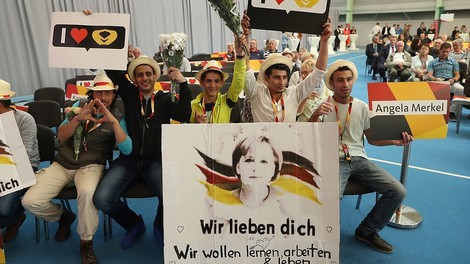Your podcast discovery platform
Curious minds select the most fascinating podcasts from around the world. Discover hand-piqd audio recommendations on your favorite topics.

piqer for: Global finds Doing Good
Graduating from 3A School of Business and Development, Nina was first involved professionally in humanitarian work as a trainer and manager in France and abroad. Her research in the field questioning engagement and altruism conducted her to work as an editor, writing articles. From 2011 to 2015, she worked in Russia as the web chief editor of a French newspaper. She’s now based in France and works as a freelancer on several projects, including writing, and trainings on Solutions journalism or Media decoding. She’s representing the Solutions Journalism Network in Europe since October 2016, which conducted her to train journalists in Denmark, Moldova, Poland, France, and Belgium, and give presentations to several newsrooms.
Is The Way Germany Has Handled Refugee Integration A Model That Others Should Follow?
The 629 migrants on board the Aquarius who were rescued in the mediterraneen sea and turned away by Italy and Malta have finally arrived in Spain's port of Valencia on June 17th. Spain's new socialist government has promised free healthcare, and says it will investigate each asylum case.
Since the beginning of the Syrian war, welcoming migrants and refugees seems to be one of the most pressing issues in Europe. Every once in a while, we are overwhelmed by this migrant "threat" in the media, and then we don't hear about it anymore for a few months, until something dramatic happens again.
Solutions journalism is rigorous reporting on how people respond to problems, by asking the question: "Facing that same problem, who is doing better?"
Who, since the beginning of the migrant crisis, has been doing better in welcoming those millions of refugees arriving in Europe? Germany and Sweden have opened their doors to refugees more than any other country. While Sweden seems to have suffered from it, Germany seems to be managing. Over the past three years, more refugees have arrived in Germany than anywhere else in the European Union.
But Germany did not just open its doors to those seeking refuge, it recognised that integrating them into society was crucial. How did this work concretely? What are the factors leading to success, and what are the limits? How much has it affected the German economy, and its political system? How much did it cost? How well are the refugees integrated?
These are some of the important questions journalist Fi Glover asked in an excellent BBC radio programme called "My perfect country".
Asking these questions can also increase the accountability of the countries that are refusing to accept refugees. It can also help contribute to a higher level public debate on such issues.
